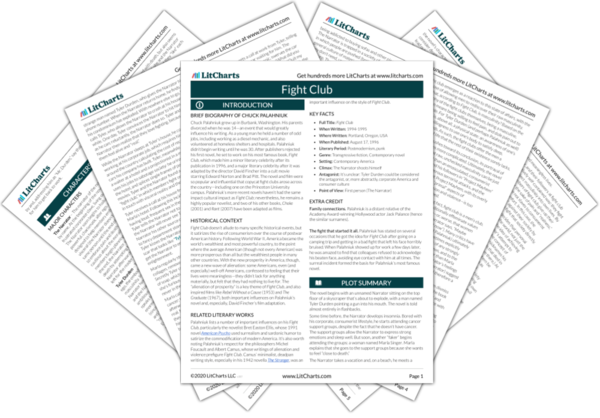Fight Club is a story of rebellion: frustrated, emasculated men rebelling against what they perceive as an unjust, effeminized society that forces them to live dull and meaningless lives.
At first, Tyler, the Narrator, and their followers at fight club “rebel” in an individual, relatively self-contained way: they fight with each other in order to inject masculinity into own lives. By beating each other up, the members of fight club give up their own complacency and safety for the sake of pain and “realness,” proving to themselves that they’re not slaves to consumerist society and a culture of shallow comfort. In this case, the members of fight club are “rebelling” against their society by escaping from it. They’re not trying to fight that society directly.
But over the course of the novel, Tyler decides that personal rebellion isn’t enough: one must change the world, not just the self. Much as the fight club was based on the idea of achieving freedom through pain, Project Mayhem, Tyler’s attempt to rebel against the world, is centered around the concept of sacrificing oneself for a larger cause. (He even nicknames his followers “space monkeys,” after the test animals that died in outer space so that, later on, humans could survive there.) At first Tyler insists that the followers of Project Mayhem be willing to sacrifice their property and their identities as individuals in order to destroy a civilization he sees as tyrannical and oppressive. Tyler’s rebellions against society soon become more violent and more centered on achieving complicated, external goals, however. Furthermore, Tyler’s own “society,” Project Mayhem, becomes just as repressive and evil as the society he’s trying to destroy.
In the end, the novel seems to suggest, any rebellion against the established order eventually devolves into its own kind of tyrannical establishment—perhaps necessitating a brand-new rebellion, and so on. When the Narrator begins to work against Project Mayhem, Palahniuk leaves it unclear if the Narrator is rebelling against Tyler’s tyranny or if he just doesn’t have enough faith in Tyler’s plans. As with the novel’s take on the “real,” Palahniuk arguably cannot commit to depicting what a “perfect rebellion” would look like, because in doing so, he would be imposing his own “tyrannical” view on the reader (not to mention that giving such a nihilistic, misanthropic novel an explicit moral would contradict the basic mood of the story). Instead, he leaves it up to the reader to decide.
Rebellion and Sacrifice ThemeTracker

Rebellion and Sacrifice Quotes in Fight Club
The first rule about fight club is you don't talk about fight club.

Unlock explanations and citation info for this and every other Fight Club quote.
Plus so much more...
Get LitCharts A+The first night we fought was a Sunday night, and Tyler hadn't shaved all weekend so my knuckles burned raw from his weekend beard. Lying on our backs in the parking lot, staring up at the one star that came through the streetlights, I asked Tyler what he'd been fighting. Tyler said, his father.
"You have to see," Tyler says, "how the first soap was made of heroes."
Think about the animals used in product testing.
Think about the monkeys shot into space.
"Without their death, their pain, without their sacrifice," Tyler says, "we would have nothing."
When Tyler invented Project Mayhem, Tyler said the goal of Project Mayhem had nothing to do with other people. Tyler didn't care if other people got hurt or not. The goal was to teach each man in the project that he had the power to control history. We, each of us, can take control of the world.
The applicant has to arrive with the following:
Two black shirts.
Two black pair of trousers.
Raymond K. K. Hessel, your dinner is going to taste better than any meal you've ever eaten, and tomorrow will be the most beautiful day of your entire life.
"What it is," Tyler says, "is we have police who come to fight at fight club and really like it. We have newspaper reporters and law clerks and lawyers, and we know everything before it's going to happen."
We were going to be shut down.
"At least in Seattle," Tyler says.
I ask what did Tyler do about it.
"What did we do about it," Tyler says.
We called an Assault Committee meeting.
"His name is Robert Paulson."
And the crowd yells, "His name is Robert Paulson."
The leaders yell, "He is forty-eight years old."
And the crowd yells, "He is forty-eight years old."
The three ways to make napalm. I knew Tyler was going to kill my boss. The second I smelled gasoline on my hands, when I said I wanted out of my job, I was giving him permission. Be my guest.
Kill my boss.
Oh, Tyler.
I know a computer blew up.
I know this because Tyler knows this.
There's Marla.
Jump over the edge.
There's Marla, and she's in the middle of everything and doesn't know it.
And she loves you.
She loves Tyler.
She doesn't know the difference.
Somebody has to tell her. Get out. Get out. Get out.
His name was Patrick Madden, and he was the mayor's special envoy on recycling. His name was Patrick Madden, and he was an enemy of Project Mayhem.
Tyler says, "The last thing we have to do is your martyrdom thing. Your big death thing."
“Everything's going according to the plan.”
Whispers:
“We're going to break up civilization so we can make something better out of the world.”
Whispers:
“We look forward to getting you back.”











